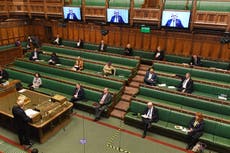Schools told to consider stocking long-life products in no-deal Brexit preparations
Providers may need to consider buying in frozen food, guidance says

Schools have been advised to stock long-life products as part of no-deal Brexit preparations.
Government guidance has suggested they make sure they are ready for “possible changes to their food supply chain from 1 January” — when the transition period ends, and the UK leaves the single market and customs union.
On Tuesday, Boris Johnson warned that it is "far from certain" that Britain will manage to get a post-Brexit trade deal with the EU in time for the end of the year, amid ongoing talks.
On the same day, the Department for Education (DfE) published updated guidance for schools to help them “prepare for food supply chain changes” from the start of next year.
While much of this echoes past guidance for schools preparing for Brexit, schools have now been advised to think about long-life products.
Schools have been told they may need to consider ordering products with a longer shelf life — such as frozen foods, or ones that can be stored safely at room temperature — from the start of next year in the updated guidance.
Repeating the same message as Brexit guidance withdrawn in March, schools have been advised to contact suppliers before 1 January to check whether they will need to change meals or ingredients, and that secondary suppliers are prepared.
They have also been told to consider varying “the timing and number of deliveries to allow for transport delays”, and to be as flexible as possible with delivery slots.
In response to the guidance, Paul Whiteman from the school leaders’ union NAHT said: “Schools are being told to contact food suppliers to make sure they are planning for the potential impacts of Britain leaving the EU.
“Let’s be frank: there’s almost nothing that any school can meaningfully do to mitigate the effects of Brexit, as they have no control over what will happen after 1 January."
The general secretary of the union added: “Equally, it is impossible for schools to know just what the impacts of Brexit will be."
Mr Johnson told ministers on Tuesday time was now “very short” if both sides wanted to get a deal ready before the end of the year, and “significant issues” still remained — most notably on future fishing rights and the so-called "level playing field" rules on state aid.
Talks have been continuing this week in Brussels between the EU's chief negotiator Michel Barnier and his UK counterpart Lord Frost.
The Department for Education has been approached for comment.
Additional reporting by Press Association
Join our commenting forum
Join thought-provoking conversations, follow other Independent readers and see their replies
Comments





Bookmark popover
Removed from bookmarks